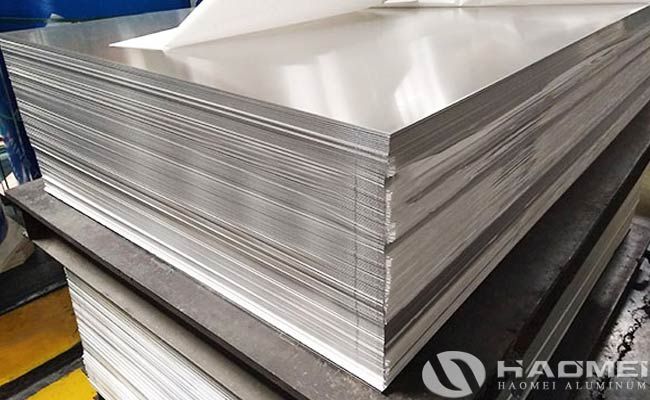Aluminium sheets show good corrosion resistance in most environments. The core reason why aluminium sheets do not corrode easily is that their surface can spontaneously form a dense and stable oxide protective film. The specific principle is as follows:

- Quick formation of oxide film
Aluminum is a metal with relatively active chemical properties. When exposed to air, the aluminum atoms on the surface will quickly react with oxygen to form a thin layer of aluminum oxide (Al₂O₃) film. This process is completed almost the moment the aluminum contacts the air.
- Protective effect of oxide film
Aluminum oxide film has two key characteristics:
Density: Its structure is very dense and can cover the surface of aluminum like a "barrier", preventing the internal aluminum from continuing to contact oxygen, moisture or other corrosive substances in the air.
Chemical stability: The chemical properties of aluminum oxide are stable and it is not easy to react with common acids and alkalis (in weakly corrosive environments), so this film itself is not easy to be destroyed.
- Self-repairing ability
If the oxide film on the surface is partially damaged due to slight friction or scratches, the exposed fresh aluminum will immediately react with oxygen again, quickly generate a new aluminum oxide film, repair the "barrier", and continue to play a protective role.
In contrast, the oxides of metals such as iron (such as rust) have a loose structure and cannot prevent further corrosion of the internal metal. Therefore, the corrosion resistance of aluminum is much better than that of unprotected iron. This feature makes aluminium sheets widely used in construction, transportation, daily necessities and other fields.
The corrosion resistance of aluminum alloys is closely related to their alloy composition, microstructure and surface treatment process. Different series of aluminum alloys have different corrosion resistance due to the addition of different alloying elements (such as manganese, magnesium, zinc, copper, etc.). Among them, the series with manganese (Mn) and magnesium (Mg) as the main alloying elements usually have excellent corrosion resistance.
1. 1000 Series Aluminum Alloy (Pure Aluminum Series)
Composition: Pure aluminum with a purity of more than 99.0% (such as 1050, 1060, 1100, etc.), almost no other alloying elements.
Corrosion resistance: It is the best corrosion resistant type among all aluminum alloys. Its principle is the same as pure aluminum - a dense aluminum oxide (Al₂O₃) protective film can be quickly formed on the surface without interference from other alloy elements. The oxide film is extremely stable and can effectively resist corrosion from the atmosphere, water and most weak acids and alkalis.
Limitations: Low strength (hardness of about 20-30 HB), only suitable for scenes with low strength requirements (such as aluminum foil, heat sinks, decorative parts, etc.).
2. 3000 series aluminum alloy (aluminum-manganese alloy)
Composition: Manganese is the main alloying element (manganese content 1.0%-1.5%), typical grades such as 3003 aluminum sheet and 3A21.
Corrosion resistance: The corrosion resistance is close to pure aluminum (1000 series), and is better than most aluminum alloys containing copper and zinc. The addition of manganese will not destroy the density of the surface oxide film, but can refine the grains and improve the alloy's resistance to stress corrosion.
Application: Because it has a certain strength (higher than 1000 series) and good corrosion resistance, it is often used in food packaging (such as cans), air conditioning radiators, pipes, etc.
3. 5000 series aluminum alloy (aluminum-magnesium alloy)
Composition: Magnesium is the main alloying element (magnesium content 3%-5%), typical grades such as 5052 aluminum sheet, 5083, 5754, etc.
Corrosion resistance: It is the best corrosion resistance among medium and high strength aluminum alloys. The addition of magnesium can promote the formation of a more stable oxide film on the surface, and the alloy has outstanding resistance to intergranular corrosion and seawater corrosion (especially when the magnesium content is 3%-4%, the corrosion resistance is the best).
Advantages and applications: The strength is higher than 3000 series (the tensile strength of 5083 aluminum sheet can reach more than 300MPa), and it has excellent resistance to seawater and humid atmosphere. It is widely used in ship components, marine engineering, pressure vessels, refrigeration equipment, etc.
Although aluminium sheets have good corrosion resistance, their corrosion resistance may be weakened in certain environments, such as environments containing chloride ions (such as seawater or air near the ocean), or in strong acid or alkali environments. This is because these environmental factors can destroy the protective aluminum oxide film, causing the aluminum material underneath to corrode. Therefore, in actual applications, it is sometimes necessary to take certain anti-corrosion measures for aluminium sheets, such as painting, anodizing, etc., to enhance their corrosion resistance in response to different usage environments.
live:onlinehcx